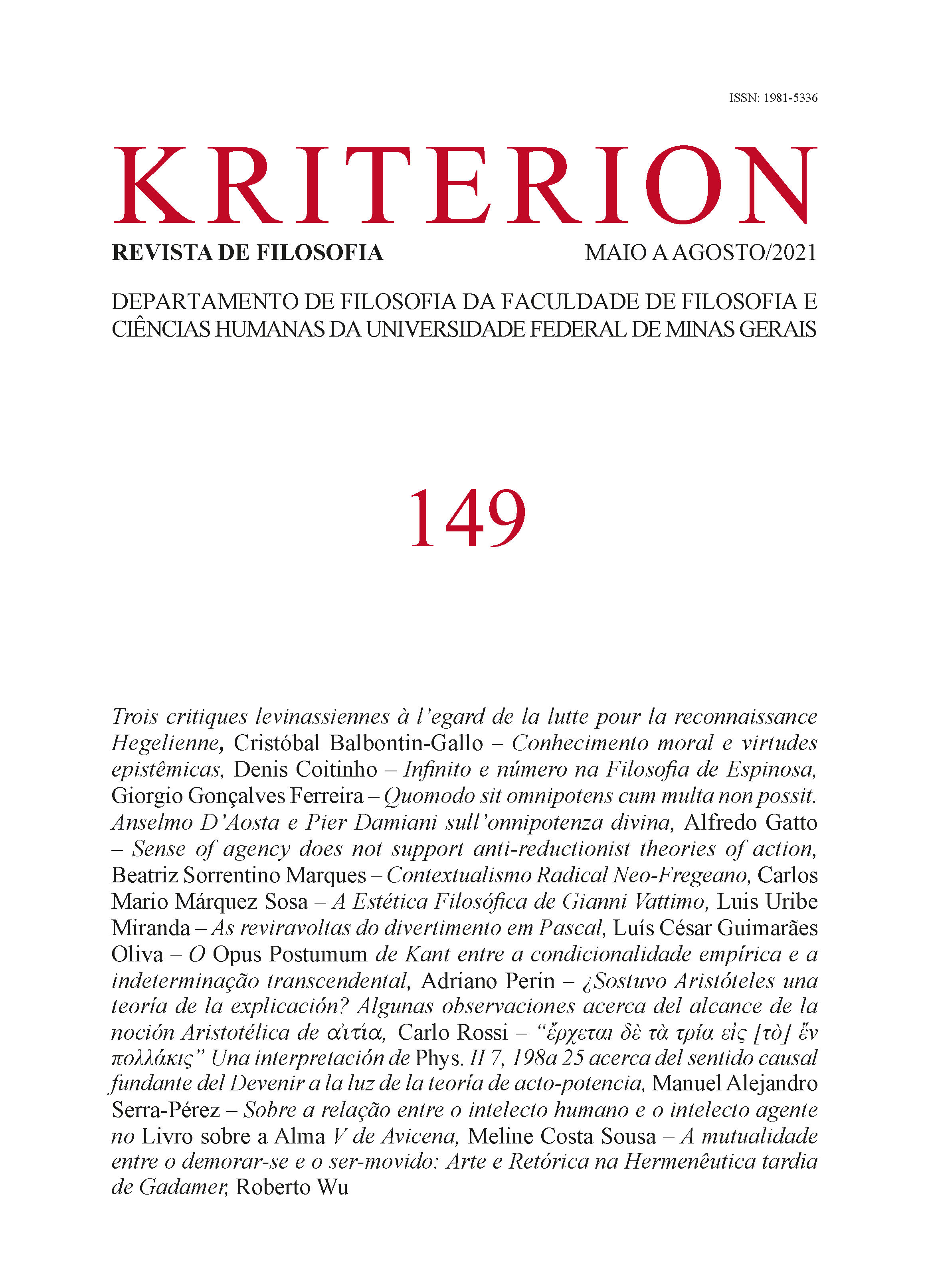Infinite and number in Spinoza's philosophy
Keywords:
Spinoza, Infinity, Indefinite, Number, ContinuousAbstract
The purpose of this paper is to analyze the relationships between infinite and number in Spinoza's philosophy. Thus, the analysis will begin by looking at Letter 12 and distinguishing the notions of actual infinite, indefinite, unlimited, and non-enumerable. At this point, the article will attempt to show in what sense the notions mentioned above differ and why they cannot be confused. In dealing with the notion of number and non-enumerable quantities, the analysis will focus on the example of non-concentric circles, offered by Spinoza, and will show that, besides the continuum, what is at stake in the example cited is what posteriorly would come to be known as irrational numbers. After that, the article will deal with the notion of beings of reason, and will show how the time, measure, and number differ as beings of reason. Lastly, the article concludes by pointing out that (i) it is the number that depends on infinite to be conceived, not the reverse; and that (ii) Spinoza's legacy opens the way for a new way of thinking about infinity, which will be explored by Cantor.
Downloads
References
ADAM, C., TANNERY, P. “Oeuvres de Descartes”. Paris: Vrin, 1964-74. (12 Vols.)
ARIEW, R. “The Infinite in Spinoza’s Philosophy”. In: CURLEY; MOREAU (Eds),
“Spinoza: Issues and Directions – The Procedings of the Chicago Spinoza Conference”,
pp. 16-31, Brill, 1990.
CANTOR, G (1883). “Foundations of a General Theory of Manifolds”. The Campaigner:
Journal of the National Caucus of Labor Committee, Vol. 9, Nr. 1-2, pp. 69-96, Jan-
Feb. 1976.
DEA, S. “The Infinite and the Indeterminate in Spinoza”. Dialogue, Vol. 50, Special
Issue 03, pp. 603-621, set. 2011.
DESCARTES, R (1644). “Princípios da Filosofia”. Tradução de João Gama. Lisboa:
Edições 70, s/d.
EUCLIDES (300 a.c.?). “Os Elementos”. São Paulo: Ed. UNESP, 2009.
ESPINOSA, B (entre 1660 e 1663). “Tratado da reforma da inteligência”. Tradução,
introdução e notas de Lívio Teixeira. São Paulo: Martins Fontes, 2004.
______ (entre 1665 e 1673). “Ética”. Tradução de Tomaz Tadeu. Belo Horizonte:
Autêntica, 2009.
______ (1663). “Carta 12”. In: GUINSBURG, J., CUNHA, N., ROMANO, R. (orgs.).
Spinoza: Obra completa. Tradução e notas por Jacob Guinsburg e Newton Cunha. São
Paulo: Perspectiva, 2014. (4 Vols.)
______ (1663). “Princípios da Filosofia Cartesiana e Pensamentos Metafísicos”.
Tradução de Homero Santiago e Luís Cesar Oliva. Belo Horizonte: Autêntica, 2015.
GEBHARDT, C. (ed.). “Spinoza Opera”. Im Auftrag der Heidelberger Akademie der
Wissenchaften herausgegeben von Carl Gebhardt. Heidelberg: Carl Winter, 1925. (4 Vols.)
GUEROULT, M. “Spinoza, I – Dieu (Éthique I)”. Paris: Aubier-Montaigne, 1968.
GUINSBURG, J., CUNHA, N., ROMANO, R. (orgs.). “Spinoza: Obra completa”.
Tradução e notas por Jacob Guinsburg e Newton Cunha. São Paulo: Perspectiva, 2014.
(4 Vols.)
NACHTOMY, O. “A tale of Two Thinkers, One Meeting, and Three Degrees of Infinity :
Leibniz and Spinoza (1675-8) ”. British Journal for the History of Philosophy, Vol.
, Nr. 5, pp. 935-961, 2011.
NEWSTEAD, A. “Cantor on Infinity in Nature, Number and the Divine Mind”. American
Catholic Philosophical Quarterly, Vol. 83, Nr. 4, pp. 533-553, 2009.










